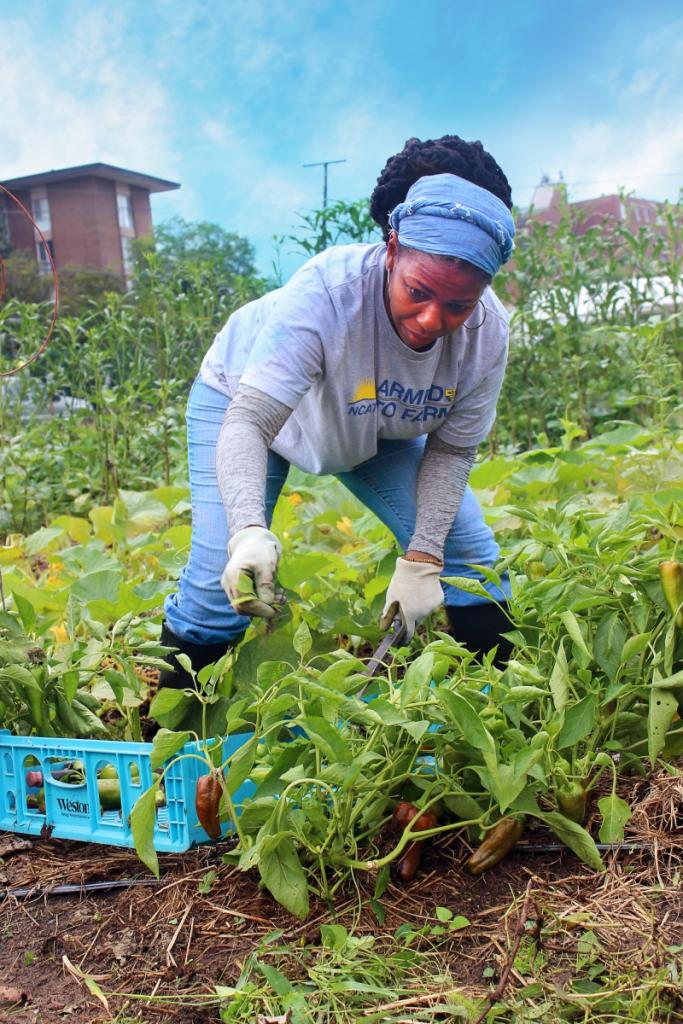
Connecting people and agriculture is a critical need. We face challenges in feeding our growing population, and most Americans lack of exposure to agriculture and food production. With ever more people living in urban areas, understanding agriculture through an urban lens can provide both a connection and an educational opportunity. Since the U.S. Botanic Garden’s creation 200 years ago, one of the Garden’s primary functions has been growing and demonstrating plants to tell the story of agriculture and economic plants to the public.
Using our own urban setting and building on our long history of growing plants and educating people about them, the USBG is:
- Working to promote science and environmental learning through sustainable agriculture in urban settings;
- Supporting health and well-being in urban communities by increasing food access through local food production;
- Fostering community engagement through meaningful connections with food and agriculture.
By building a network of organizations helping with food production and education across the country, the Garden is strengthening people’s capacity to transform their lives, institutions, and communities through engagement in urban agriculture.
Read below to learn more about the U.S. Botanic Garden’s urban agriculture work.
 Urban Agriculture Resilience Program 2025
Urban Agriculture Resilience Program 2025
The United States Botanic Garden (USBG) and American Public Gardens Association (Association) are awarding support to 25 public gardens and their community partners engaging in urban agriculture, food-growing, and related education work. The 25 awards total $461,434 in support for public garden partnerships across the United States that will foster public engagement and education in urban food growing and build capacity in urban agriculture programs. The Urban Agriculture Resilience Program aims to strengthen collaborations, promote resilience, and gather best practices from across the U.S.
The funds will help programs in 16 states and Washington, D.C. integrate urban food growing and urban agriculture education while addressing food security challenges in their communities. The program seeks to leverage the strength of public gardens working with partners in their communities, ranging from schools, universities, and urban farms to food pantries, community gardens, local government agencies, and nonprofit organizations. This year, the program especially sought to support collaborations involving smaller public gardens, as well as organizations demonstrating a strong commitment to inclusion, diversity, equity, and accessibility.
Over the program's six years, we have awarded $1.57 million to 106 collaborations in 34 states and D.C. These programs have grown and shared over 720,000 pounds of produce, distributed more than 268,000 seedlings, and provided more than 49,000 hours of urban agriculture training to students, interns, and trainees.
“The collaborations supported through this year’s Urban Agriculture Resilience Program demonstrate many creative ways that urban agriculture can connect people and plants through food,” said Dr. Susan Pell, USBG executive director. “We are thrilled to embark on a fifth year of supporting such vital urban food-growing programs across the country and to expand the existing Urban Agriculture Resilience Program community with these 26 new projects.”
The Urban Agriculture Resilience Program began in 2020 as a way for the USBG and the Association to support and expand urban agriculture and food-growing programs at public gardens. Learn more about previous awardees at www.USBG.gov/UrbanAg.
2025 Urban Agriculture Resilience Program Awardees:
Alabama
- Legacy Heritage, in collaboration with E.A.T SOUTH and David's Garden of Life Foundation
Arizona
- Desert Botanical Garden, in collaboration with Blue Watermelon Project, V.H. Lassen Academy of Science & Nutrition, and Spaces of Opportunity
- TigerMountain Foundation, in collaboration with MAC6
California
- Filoli, in collaboration with Pasifika Planting Group and La Cocina
- Growing Hope Gardens, in collaboration with Community Corporation of Santa Monica, Holos Communities, Core Response, and The Malibu Foundation
- Guadalupe River Park Conservancy, in collaboration with Muwekma Ohlone Preservation Foundation
Delaware
- Delaware Center for Horticulture, in collaboration with Woodlawn Trustees
District of Columbia
- Edgewood Community Farm, in collaboration with ReDelicious
Florida
- Urban GreenWorks, in collaboration with Carrfour Supportive Housing, ShareNest, Barry University CRAFT Scholars, Culinary Drip, and CombCutters Live Bee Removal
- Vizcaya Museum and Gardens Trust, in collaboration with Motivating Minds, The Br Project Inc, and Common Threads Incorporated
Georgia
- Columbus Botanical Garden, in collaboration with Feeding the Valley Food Bank
Illinois
- Quad City Botanical Center, in collaboration with Tapestry Farms and Nest Cafe
Indiana
- Minnetrista Museum & Gardens, in collaboration with Muncie Public Library - Connection Corner and Kennedy Library branches, Ross Community Center, Mitchell Early Childhood and Family Center, Motivate Our Minds, and Whitely Community Food Pantry
Maryland
- Community Food Forest Collective, in collaboration with Montgomery College
Missouri
- EarthDance, in collaboration with The Wild Ones, Strength and Honor Mentoring and Tutoring, and Unleashing Potential
North Carolina
- Bountiful Cities, in collaboration with Hood Huggers Foundation and Asheville City Schools
- North Carolina Botanical Garden, in collaboration with UNC Counseling and Psychological Services
New York
- Finca La Florecita at LaGuardia Community College, in collaboration with Queens Botanical Garden
- The Pine Hollow Arboretum, in collaboration with Free Food Fridge Albany
Ohio
- Food Strong, in collaboration with Willson Elementary School
Pennsylvania
- Fair Amount Food Forest, in collaboration with Brothers of Strawberry Mansion, Strawberry Mansion High School Culinary Arts, and Chef Gail Hinson
Tennessee
- Lookout Mountain Conservancy, in collaboration with Food Forest Coalition of Chattanooga
Texas
- Killeen Creators, in collaboration with Killeen Volunteers, Communities In Schools, and the Bell County Master Gardeners Association
- UNT Community Garden, in collaboration with UNT Food Pantry presented by Kroger and City of Denton Sustainability Department (Sustainable Denton)
- Urban Harvest, in collaboration with Houston Botanic Garden
Learn about the 2020 Urban Agriculture Resilience Program, the 2021 Program, the 2022 Program, 2023 Capstone Program, and the 2024 Program >
See all the awardees of Urban Agriculture Resilience Program 2020 to present:
 Training Veterans in Urban Farming as a Career
Training Veterans in Urban Farming as a Career
 Greenhouse Manual and Trainings for Educators
Greenhouse Manual and Trainings for Educators Online Food and Agriculture Programs
Online Food and Agriculture Programs
